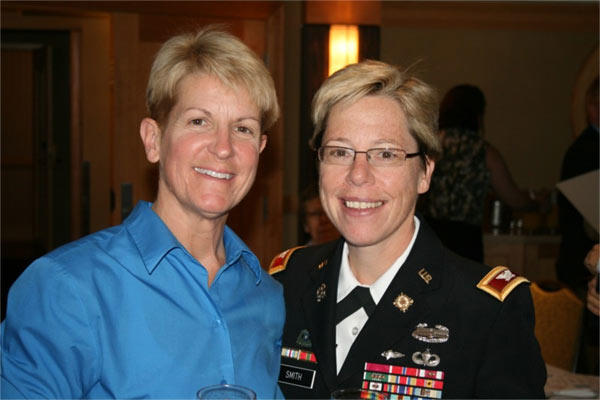WASHINGTON – Defense Department efforts to increase diversity in its workforce welcomes talented people to hire on and help protect national security, the deputy chief of staff of the Army Reserve said last week.
In a DoD News interview, Army Brig. Gen. Tammy S. Smith discussed the importance of leadership, this year’s theme for DoD’s Lesbian, Gay, Bisexual and Transgender Pride Month observance.
“The entire Defense Department is about leadership, and [that theme] is in line with what DoD values most in uniformed individuals and civilians,” Smith said of the June recognition.
From leadership springs diversity and inclusion in the LGBT community, she noted, and it makes LGB service members and LGBT civilians feel welcome in jobs where they can thrive and contribute.
"I felt that DoD leadership embraced the repeal of the Don't Ask, Don't Tell policy in 2011,” Smith said.
And when the U.S. Supreme Court struck down the Defense of Marriage Act in 2013, Defense officials “stepped up and said similarly situated families should be treated as families,” she said.
As a service member who can now serve as “openly” as a member of the LGBT community, the observance marks professional and personal milestones for Smith.
“The LGBT observance in 2015 is significant to DoD when you consider it was only in 2011 when someone like me would have been kicked out of the military simply for being who I was, regardless of how qualified I was in my job,” she said.
Lived a Compartmentalized Life
The first 25 years of her 29-year military career presented challenges for Smith.
Before the DADT repeal, Smith said, “I handled it by living a compartmentalized life. I had two sets of friends: work friends and my off-the-grid friends -- members of the LGBT community. We knew who each other was, and in that world we could be who we really were.”
And her two worlds could never cross, the general said.
“If I saw off-the-grid friends at work, I had to walk past them and pretend I didn’t know them,” she said. “It would have raised questions like, ‘How do you know Jones?’”
Keeping her two worlds separate was difficult and took great physical and emotional effort, Smith said.
While she felt relieved from the burden of living two lives after the 2011 DADT repeal, Smith said she had to heal after 25 years of being unable to be herself.
Smith said she had to learn new social skills, such as knowing it was OK to introduce her civilian wife, Tracey Hepner, at social functions as her spouse.
“In the military, we put so much emphasis on family support,” she said. “Under DADT, I couldn’t share my family -- the most important thing in my life.”
But in 2013, when the Defense of Marriage Act was struck down and more doors opened to the LGBT community, Smith said she was able to marry Hepner and do what heterosexual military families were permitted to do, such as live on post.
Today, Smith feels as though the Army accepts her for who she is, and she can share in workplace conversations about her family without hiding.
Educating Others with Outreach
In her outreach work, Smith speaks to people at the installation level and sometimes at commands and other agencies.
Her audiences learn the observance of LGBT pride isn’t about orientation, the general said. It’s about “who we are and who our families are,” she said, noting that she tells her personal story so others know what it was like to live under DADT and how the repeal changed her life.
“I hope it validates individuals who have lived through it,” she says of her work. She also hopes her outreach work will help DoD keep up with the rapid pace of change, she added.
Just Another Day After DADT Repeal
Smith recalls Sept. 20, 2011, when DADT was repealed. In the dining hall at Bagram Airfield in Afghanistan, she wanted to catch another’s eye to see if someone else was having a “completely different day,” like she was.
“You know what? I got nothing. It was just another day at Bagram … and that was absolutely perfect about the repeal,” she said.




























